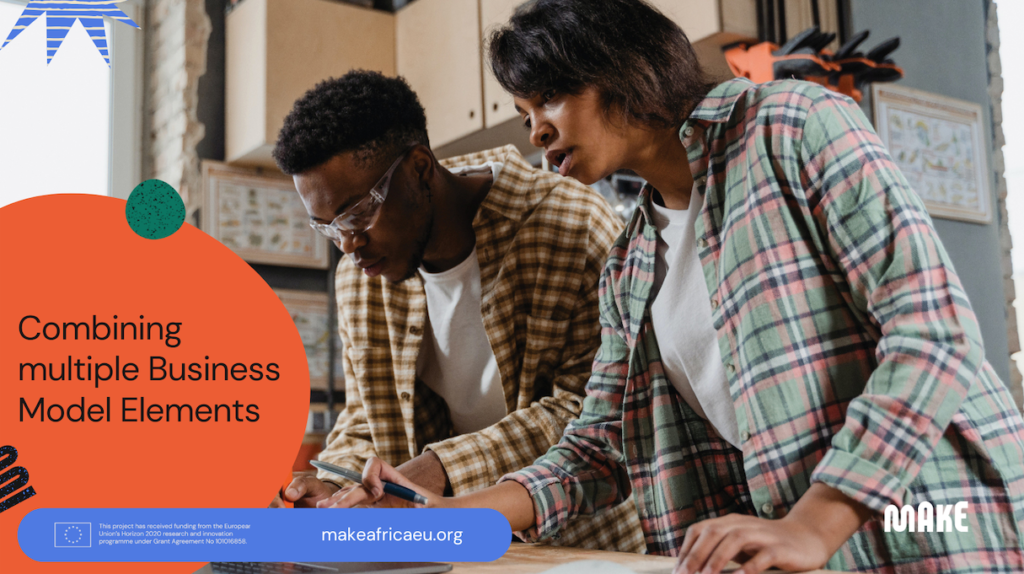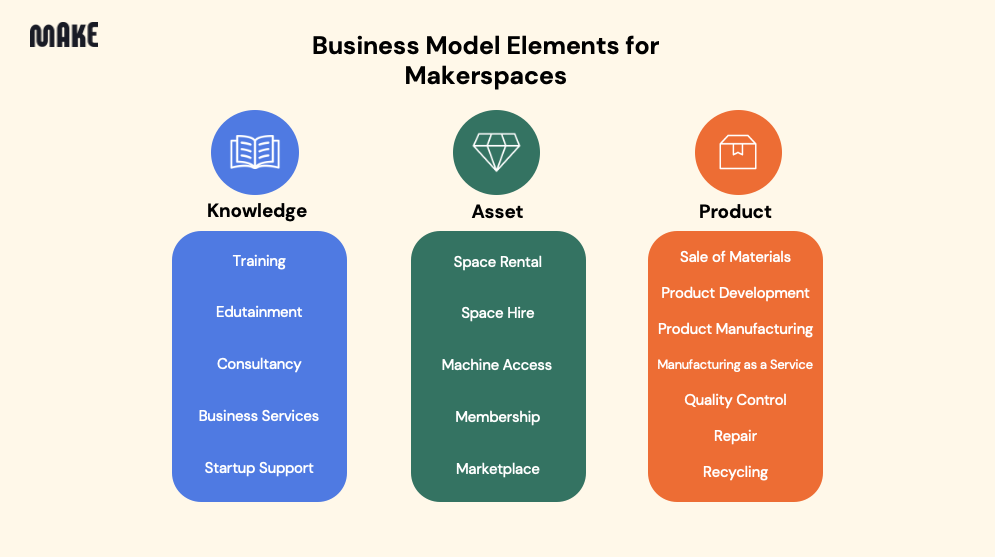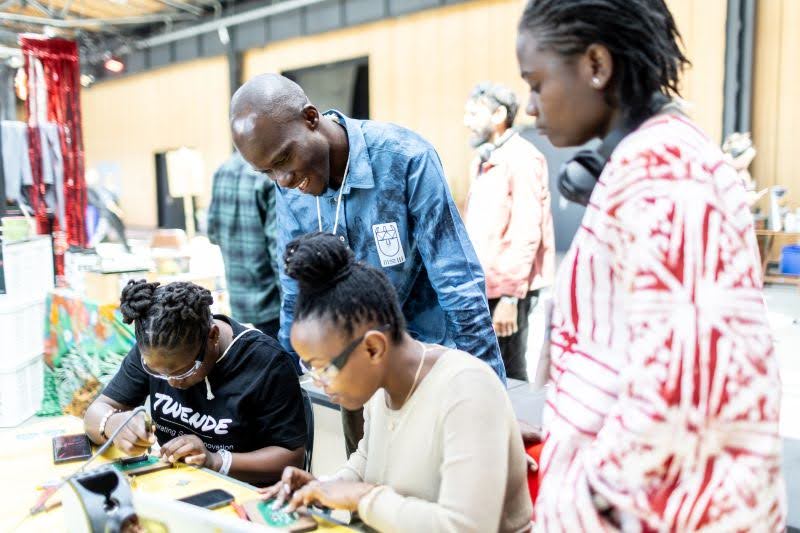New resource expand the mAkErverse sustainability: the Open Catalogue of Business Models and website launch
- January 31, 2024
- 12 min read
- mAkE (African European Maker Innovation Ecosystem), focusing on African and European community-supported Digital Innovation Hubs (DIHs) and makerspaces is successfully reaching its second-year landmark.
- The Open Catalogue of Business Models (OCBM) is a comprehensive resource developed to address the financial sustainability challenges faced by makerspaces.
- The project’s output, one of the central tools of mAkE as an open source resource for other makers to explore, has now evolved into a live website – LocalEconomies.org – ensuring continuous updates and the incorporation of user feedback.

January 31, 2024.
Over the last 2 years, the mAkE project has actively worked to enhance the sustainability and collaboration among African and European Digital Innovation Hubs (DIHs)/makerspaces and the startups they support. This progress was achieved through various initiatives, including the introduction of the Maker in-residency program and the launch of the PSS, a powerful new way for individual makers to share their personal skills, experience and accomplishments. Additionally, monthly discussions focusing on the financial sustainability of makerspaces, along with presentations on diverse business model ideas and firsthand experiences, supplemented by a set of insightful interviews, have collectively led to the development of a structured Catalogue. This Catalogue delineates various components essential for composing effective business models for makerspaces, giving the opportunity to build the best possible options for a makerspace’s needs.
Anna Sera Lowe, part of mAkE project and the creator of the OCBM, underlines the work done to reach this milestone and to successfully launch the website:
Based on interviews with over fifty organisations, we have launched the web site LocalEconomies.org to share the Open Catalogue of Business Models developed for the mAkE project. This contains information on business models being used successfully by makerspaces and local manufacturing ecosystems across Europe and Africa. In the future we hope to expand the research to cover the rest of the world, as well as introducing new types of organisation.
Barbara Kieslinger, the project coordinator, stresses the importance of this achievement within the project:
Knowing that there are alternatives to the traditional way of gaining financial sustainability is so important for makerspaces. I am very happy that the Open Catalogue of Business Models offers these alternative elements, which may spark creative, innovative ideas for the future. Seeing the wide interest, up-take and collaborative effort makes me confident that the catalogue will live on, long beyond the mAkE project, as an important source of inspiration.
The Catalogue is crucial for all the network of makerspaces, as Joseph Agyina, leading the African Makerspace Network, highlights as well:
The models give our makerspaces the opportunity to be the primary protagonist in our own story. With issues of funding always becoming the white elephant in the room, this business catalogue provides a better approach for our makerspaces and digital innovation to have a business plan that could aid in financial breakthrough instead of solely depending on external donors. This is very relevant to our members due to the fact that the model highlights the key value proposition that could attract potential donors or payers in sharing our expertise.
This catalogue serves as a key tool for our members to identify opportunities that could engineer potential revenue streams, reduce cost of production, increase innovation, access to resources and potential collaborations that ensure the sustainability of makerspaces in Africa.
Ronald Tsatsi, Makerspace Lead of iZone Hub, having taken part to the Makerspace Mentoring Program, highlights the value of the new platform:
I have found the Open Catalogue of Business Models to be a valuable resource, especially in understanding different models and how they can be combined. This tool has the potential to greatly benefit iZone Hub and similar initiatives, providing insights that can drive innovation and strategic planning
The Need
People running makerspaces generally love to talk about the programs they run, the technologies they showcase, the projects and individuals that they help. Ask them about their own financial sustainability, and the conversation becomes less confident. They have tried ‘a’ and ‘b’, had some success with ‘c’ but it isn’t enough by itself, they are now experimenting with ‘d’ and want to try ‘e’ and ‘f’.
Makerspaces (in the broad sense – including fablabs, hackerspaces, biolabs, artist-led creative spaces – anywhere people gather to experiment or work with physical tools or materials) are important to have in a society. They provide a place for the practical experimentation that is vital to innovation. They allow for creative expression and self-directed learning. They offer training, provide space for small businesses to form and grow, create communities where knowledge can be exchanged. With the challenges that humanity is facing, we need far more spaces where these things can happen. Yet despite all their positive impact, many makerspaces struggle to sustain themselves financially.
This isn’t the case for all spaces by any means – there are some that have well-developed and sustainable business models. Interestingly, those models are very different from each other – there doesn’t seem to be a convergence on any particular model that is even reasonably likely to be viable across different contexts. But there are examples that offer hope and inspiration.
Public sector, international development, or philanthropic funding is part of the answer. The more we can generate evidence of impact, the stronger the case becomes. But it will never be the whole answer. There are many more places where such spaces are needed than there is public funding to go around. There is a need for spaces that can be independent and experimental. Not to mention the fact that public sector and development funders are more willing to put money into ‘setting up’ a space (investment in assets such as machinery, and perhaps up to a year’s worth of running costs) but it is very difficult to find funders willing to cover ongoing running costs indefinitely. There are too many spaces that were well-funded at set-up but have fallen into disuse through lack of ongoing funding.
The Idea
No-one with any sense sets up a makerspace in order to make a profit. But we do need all kinds of makerspaces to be able to generate enough ongoing revenue to be able to keep supporting their communities and creating impact in the world. This is why we have created the Open Catalogue of Business Models (OCBM).
The environments and cultures that a space operates in, the kind of impact it seeks to have, the skills and motivations of the founders – these all differ widely enough that the idea of a “recommended” financial sustainability model for makerspaces is fairly meaningless. What we see a need for is more like a buffet – something that people running makerspaces can browse through to gain ideas, choosing elements that seem relevant to what they are trying to create. This is the idea behind the catalogue.
Most makerspaces are run by people who are passionate about technology, about innovation, about education, about community development. Relatively few have people who are passionate about business in the founding team (although some do recognise and fill this gap later). We therefore wanted to create something that is accessible to those without formal business training, and that contains guidance on what it is likely to take to make a success of different models.
The Research
Fifteen months’ worth of research went into developing the OCBM. We started out by running a series of co-creation workshops to gather information on what the catalogue needed to be, do, or contain in order to be useful. We ran these firstly with all the partners in the mAkE consortium and then with various different networks and communities, including with the Global Innovation Gathering in Berlin, AfricaOSH in Yaounde, and AMN in Cape Town.
Some of the key insights that emerged from these workshops were:
- One of the great challenges in finding appropriate business models for makerspaces is to balance financial sustainability with desired impact. If someone has started a makerspace with the intention of working with some of the poorest people in their community, there is no point in charging a fee for their services that means only the rich can access it. More subtly, time the makerspace staff spend applying for grants or finding local businesses that can pay to run an event in the space is time they are not spending maintaining equipment or running workshops or helping a community member with a project. We found that people running makerspaces are very aware of these challenges and wanted honest information about trade-offs. The ideal is to find revenue streams that also contribute to the social mission; in reality, sometimes the aspiration is just not to detract from it too much.
- In order to be most useful, the research should not just focus on successful makerspaces. Makerspaces that are struggling because of their context may still have valuable ideas that could work more easily in a different context. Makerspaces that have closed down can have useful lessons for those still trying to survive. And businesses that focus on doing just one thing hold many valuable insights for makerspaces that are trying to do that same thing as part of a portfolio of activities. So we decided to take an inclusive, ecosystem-wide view for who we invited for our interviews and discussions.
- There are a lot of competing demands on the time of the people running makerspaces. There is great appetite for information on business models, but it needs to be in an accessible format – easy to find and skim, then only go into detail on the parts they feel are most relevant to them. It should be as simple and actionable as possible, providing a place to start from, being clear on the options but not trying to provide masses of detail.
In parallel with the co-creation workshops we started a series of interviews. These were mainly with makerspaces from across Africa and Europe, but we also included a few spaces from elsewhere in the world and some organisations (both businesses and not-for-profits) that perform some of the activities and functions that makerspaces do. We also ran a series of community discussions on particular business models and activities with makerspaces and other organisations involved in a distributed production ecosystem – the recordings of these are available here.
In total we documented the business models of over fifty organisations – we are very grateful to those who took part in the research, and you can find a list of them here. Early on we took the decision that we would not publish documentation of the individual business models, just names of who we spoke to and the abstracted results. The main reason for this was because asking about the financial sustainability of organisations can be quite a sensitive topic, and we wanted to encourage people to be as open as possible in the interviews.
The Synthesis
An important step in synthesizing the information gathered from the interviews and discussions was to decide how far to break down the differences in model different organisations are using. The term ‘business model’ is often used to summarise the whole model used by an organisation, but we found that many makerspaces were performing in the region of 2-4 fairly different activities and we wanted to capture these separately. We considered documenting revenue streams but decided this would obscure the benefits that come from having multiple revenue streams for one activity.
We settled on documenting at an intermediate level that we term ‘Business Model Elements’ – these can be combined in multiple ways to make one overarching business model (or in some cases used alone as the entire business model). From the organisations we had spoken to we identified seventeen of these elements, in three groups:
- Knowledge based – business model elements based primarily on sharing a skill or some type of knowledge
- Asset based – those based on enabling access to certain assets, whether tangible or intangible, bought or created.
- Product based – business model elements based on playing a value-adding role in the life cycle of a product.
The full list of business model elements are shown in the diagram:

The Future
It is important to all of us working on the mAkE project that the work we do has a useful life after the end of the project – we have been working on sustainability strategies right from the start, and the OCBM is no exception.
This is how Anna Sera Lowe, part of mAkE project and the creator of the OCBM speaks about the work done around the catalogue, being her “passion project” and adopted by her company Manufacturing Change Ltd that will provide ongoing support.
With additional funding from UK AID’s Research and Innovation Systems for Africa (RISA) Fund, it was possible for the pdf catalogue to be turned into a live website at LocalEconomies.org. This will allow constant updating of the catalogue on a continuous basis and to build in some of the feedback received from users about better navigation options.
Choosing the name LocalEconomies.org for the web site reflects that makerspaces are seen as a key building block of locally productive economies. It also allows to start to extend the catalogue to cover other business types. Anna Sera Lowe is also now launching a community project to document Open Hardware business model elements, which have considerable overlap with those of makerspaces but may also throw up some different ones. We are looking for volunteers to join the working group for this initiative so if you are interested, please get in touch.
Deliverables
New outputs are available on the Zenodo platform, and on our resources page.
For media enquiries please contact: [email protected]
Download the Press Release here.
Our social media
Instagram: www.instagram.com/makeafricaeu
Facebook: www.facebook.com/makeafricaeu
Twitter: www.twitter.com/makeafricaeu
YouTube: www.youtube.com/@makeafricaeu
LinkedIn: www.linkedin.com/company/make-african-european-maker-innovation-ecosystem
This project has received funding from the European Union’s Horizon 2020 Research and Innovation programme under grant agreement number 101016858.















